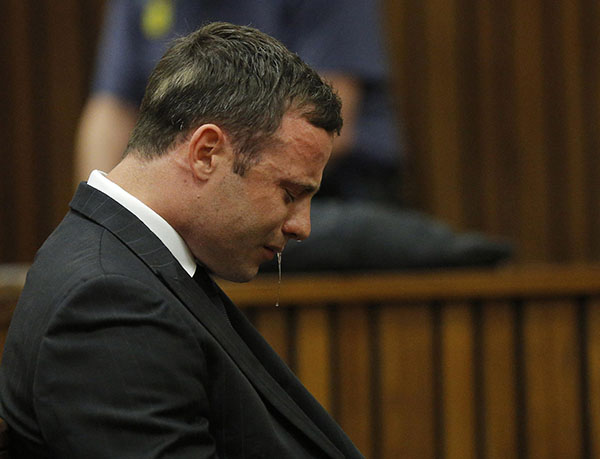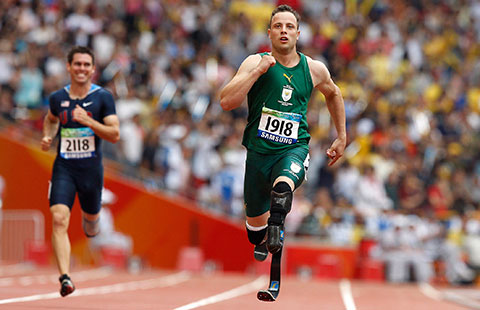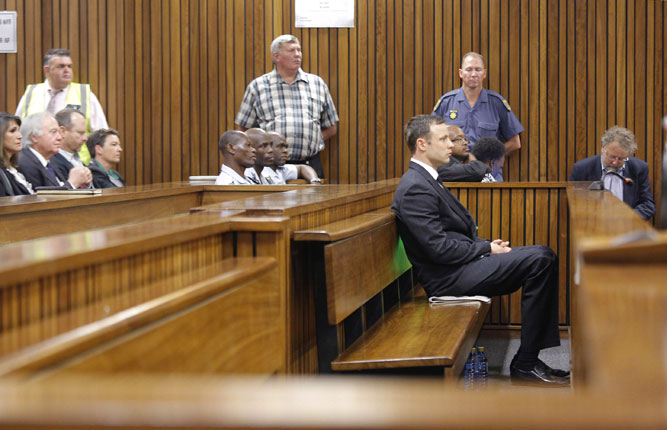Pistorius not guilty of murder but was negligent
(Agencies) Updated: 2014-09-12 10:50
 |
|
Olympic and Paralympic track star Oscar Pistorius reacts as he listens to Judge Thokozile Masipa's judgement at the North Gauteng High Court in Pretoria, September 11, 2014. A South African judge cleared Oscar Pistorius of all murder charges on Thursday, saying prosecutors had failed to prove the Olympic and Paralympic track star intended to kill his girlfriend or an imagined intruder on Valentine's Day last year. [Photo/Agencies] |
PRETORIA, South Africa - During his trial, Oscar Pistorius sometimes retched and sobbed. The double-amputee Olympian sobbed again on Thursday, this time in apparent relief as a judge said the evidence did not support a murder conviction for killing girlfriend Reeva Steenkamp.
The judge could still convict Pistorius of a negligent killing - a crime that can carry a lengthy jail term or just a suspended sentence and fine - when she likely finishes reading her lengthy conclusions in court on Friday. Some legal analysts were surprised, saying the runner could at least have been convicted of a lesser murder charge, rather than the premeditated murder charge leveled by the state.
The Pretoria courtroom was packed for the ruling in the case against 27-year-old Pistorius, once a globally admired celebrity who competed against able-bodied athletes at the 2012 Olympics in London. His brother, Carl, was there in a wheelchair because of injuries suffered in a recent car crash. So were Steenkamp's parents, June and Barry.
Steenkamp, a 29-year-old model, had been seeing the star athlete for only a few months before he killed her by shooting four times through a closed toilet door in his home in the pre-dawn hours of Valentine's Day last year. Pistorius said he thought an intruder was in the toilet and about to attack him; the prosecution said he intentionally killed her after an argument.
Judge Thokozile Masipa, wearing a red robe, unveiled her analysis of the case after saying little throughout the sensational six-month trial as lawyers argued and witnesses testified about the shocking killing. South Africa does not have a jury system, and judges customarily issue verdicts only after explaining their reasoning.
"The accused cannot be found guilty of murder," the judge said, noting there were "just not enough facts" to support the finding of guilt for premeditated murder, which carries a sentence of 25 years to life in prison, or an unplanned murder, considered a less severe crime.
To support her view that the state had not proved its case beyond a reasonable doubt, the judge said some neighbors' accounts of hearing a woman's screams on the night of Steenkamp's death - a key part of the prosecution's case - were unreliable. The defense had argued that it was Pistorius who was screaming in horror in a high-pitched voice after discovering he had fatally shot Steenkamp.
Masipa cited what she called an "objective" timeline of telephone calls made after the shooting, some involving Pistorius, that the defense had compiled in an attempt to discredit witness accounts about the sequence of purported screams and gunshots. She noted that Pistorius was reported to be in genuine distress in the immediate aftermath of the shooting, and that he could not have been "play-acting.''
Even so, the judge appeared to lay the groundwork for a conviction for culpable homicide, which is the killing of someone through reckless or negligent behavior. She described Pistorius' conduct as negligent, and said he could have telephoned security or screamed for help on the balcony instead of grabbing his gun and heading to confront a perceived danger in the bathroom.
"I am of the view that the accused acted too hastily and used excessive force," Masipa said. She also said that many people in South Africa have personally experienced the traumatic effects of the country's high crime rate but do not sleep with guns nearby.
Five years in prison is a guideline for a culpable homicide conviction in which a firearm is used, though the sentence is at the judge's discretion, according to legal experts. Pistorius also faces two separate counts of unlawfully firing a gun in a public place in unrelated incidents and one count of illegal possession of ammunition.
If he is convicted on any charge, the case will be postponed until a later sentencing hearing.
Kelly Phelps, a senior lecturer in the public law department at the University of Cape Town, said the judge's rulings so far were sound because prosecutors "never had very much evidence" to support their central allegation that Pistorius carried out a premeditated murder.
Martin Hood, a South African lawyer and firearms expert, disagreed, saying there was a strong case to convict Pistorius on a lesser charge of unplanned murder, which carries a minimum sentence of 15 years in jail. Under that scenario, Hood said, Pistorius may not have intended to kill Steenkamp because he testified that he didn't think she was in the toilet, but he did intend to kill a perceived intruder by firing multiple times into a small space.
"This was always going to be a showcase for South Africa," Hood said of the trial. "I think there's a lot of uncertainty as to the correctness of the judgment."
He added: "We have a problem in this country with violent crime. This sends the wrong message about the way we deal with violent crime."








